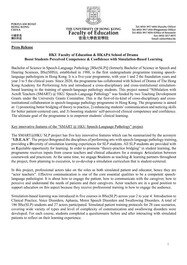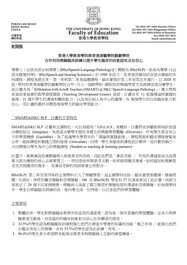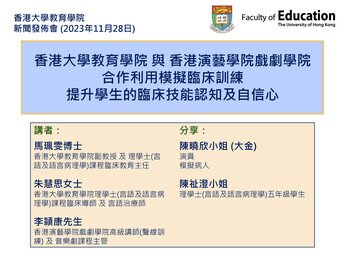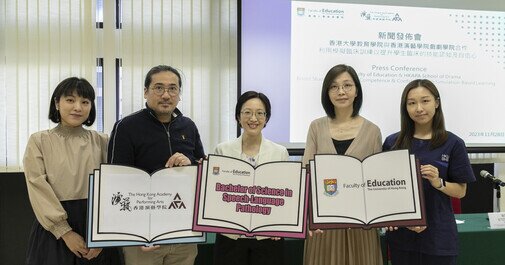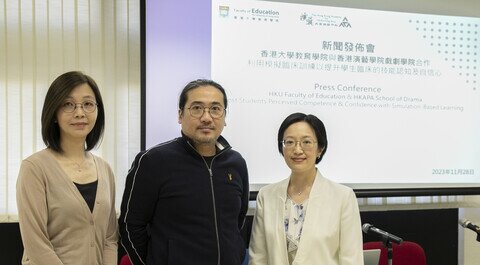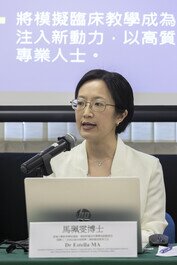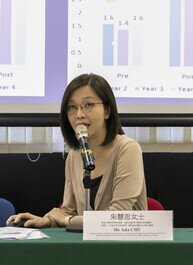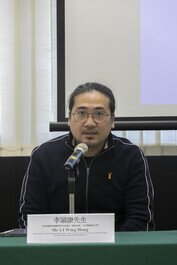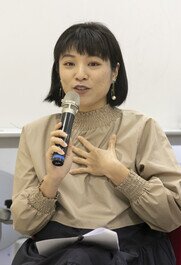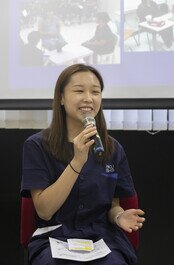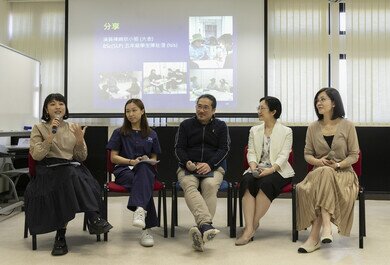Press Release: HKU Faculty of Education & HKAPA School of Drama Boost Students Perceived Competence & Confidence with Simulation-Based Learning
新聞稿:香港大學教育學院與香港演藝學院戲劇學院 合作利用模擬臨床訓練以提升學生臨床的技能認知及自信心
Updated on November 28, 2023 (Tue)
HKU Faculty of Education & HKAPA School of Drama
Boost Students Perceived Competence & Confidence with Simulation-Based Learning
Bachelor of Science in Speech-Language Pathology [BSc(SLP)] (formerly Bachelor of Science in Speech and Hearing Sciences, BSc(SHS)), established in 1988, is the first undergraduate programme training speech-language pathologists in Hong Kong. It is a five-year programme, with year 1 and 2 the foundation years and year 3 to 5 the clinical years. Since 2020, the programme has collaborated with School of Drama of The Hong Kong Academy for Performing Arts and introduced a cross-disciplinary and cross-institutional simulation-based learning to the training of speech-language pathology students. This project named “SiMulation with ActoR Teachers (SMART) @ HKU Speech-Language Pathology” was funded by two Teaching Development Grants under the University Grants Committee. This is the first-of-its-kind of cross-disciplinary and cross-institutional collaboration in speech-language pathology programme in Hong Kong. The programme is aimed at: 1) promoting better bridging of theory to practice, 2) enhancing students’ communication and noticing skills for better patient-centered care, and 3) boosting students’ self-perceived clinical competence and confidence. The ultimate goal of the programme is to empower students’ clinical learning.
Key innovative features of the “SMART @ HKU Speech-Language Pathology” project
The SMART@HKU SLP project has five key innovative features which can be summarized by the acronym “I.D.E.A.S”. The project Integrated the disciplines of performing arts with speech-language pathology training, providing a Diversity of simulation learning experiences for SLP students. All SLP students are provided with an Equitable opportunity for learning. In order to promote “theory-practice bridging” in student learning, the programme receives inputs from course teachers and clinical educators for a strategic Articulation between coursework and practicum. At the same time, we engage Students as teaching & learning partners throughout the project, from planning to execution, to co-develop a simulation curriculum that is student-centered.
In this project, professional actors take on the roles as both simulated patient and educator, hence they are “actor teachers”. Effective communication is one of the core essential qualities to be a competent speech-language pathologist. It is about how to engage the patient, how to communicate with the caregiver, how to perceive and understand the needs of patients and their caregivers. Actor teachers are in a good position to support education on this aspect because they receive professional training in how to engage the audience.
Simulation-based learning was introduced in five courses in BSc(SLP) across year 2 to year 4: Introduction to Clinical Practice, Voice Disorders, Aphasia, Motor Speech Disorders and Swallowing Disorders. A total of 186 BSc(SLP) students and 27 actors participated. Simulated patient training protocols for 28 case scenarios, covering wide variety of types and level of complexity of communication and swallowing disorders were developed. For each course, students completed a questionnaire before and after interacting with simulated patients to reflect on their learning experience.
Key findings
- Overall, students found the simulation-based learning a rewarding learning experience and were highly satisfied. Students reported a significant increase in their self-perceived clinical skills and also their level of confidence after the simulation-based learning experience.
- 32.5% of students reported that the simulation-based learning experience was “extremely useful” in bridging theory learned in lectures to clinical practice, with another 53.3% of students reported the experience was “useful”.
- Almost all students (96.4%) recommended to have more practice with simulated patients in the future.
Future development of SMART@HKU SLP
Clinical simulation is now formalised in the clinical education curriculum from 2023-24 academic year. Students in the BSc(SLP) programme will now have the opportunity to complete 26 hours of simulation learning, as part of their clinical hours, by the end of the five-year programme.
The project has evolved to become our sustainable collaboration with the HKAPA School of Drama. Our project offers internship opportunities for students in School of Drama (e.g., Bachelor of Fine Arts (Honours) Degree in Drama and Master of Fine Arts in Drama (Applied Theatre, Drama and Education)) as part of their coursework requirement. This sustainability model of cross-disciplinary and cross-institutional collaboration will serve as an exemplar in teaching and learning.
For media enquiries, please contact Ms Cheryl Cheung, Senior Manager (Development and Communications), Faculty of Education, HKU (Tel: 3917 4270 / Email: chercheung@hku.hk), or Dr Estella Ma, Associate Professor, Faculty of Education, HKU (Tel: 3917 7625 / Email: estella.ma@hku.hk).
November 28, 2023
香港大學教育學院與香港演藝學院戲劇學院
合作利用模擬臨床訓練以提升學生臨床的技能認知及自信心
理學士(言語及語言病理學)[BSc(Speech-Language Pathology)](簡稱為BSc(SLP),前身為理學士(言語及聽覺科學),BSc(Speech and Hearing Sciences))於1988年設立,是香港首個培訓言語治療師的本科課程。課程為期五年,第一年和第二年為基礎課程,臨床實習於第三年至第五年進行。自2020年起,學科與香港演藝學院戲劇學院合作,引入一個跨學科、跨院校的模擬學習方式訓練言語治療學生。 此計劃名為「SiMulation with ActoR Teachers (SMART) @ HKU Speech-Language Pathology」,獲大學教育資助委員會的教學發展撥款 (Teaching Development Grants) 資助。計劃旨在 1) 促進理論與實踐的銜接;2) 提升學生的溝通和觀察能力,以改善以病人為中心的護理;3) 增強學生的自我臨床能力和信心。而計劃的最終目標是增強學生的臨床學習能力。
「SMART@HKU SLP」計劃的主要特色
SMART@HKU SLP 計劃有五個特色,可以用縮寫「I.D.E.A.S」來概括。計劃將表演藝術與培訓言語治療師結合 (Integrate),為言語治療學生提供多樣化的模擬學習體驗 (Diversity)。所有學生都享有公平的學習機會 (Equitable)。為了促進學生學習中的「理論與實踐銜接」,課程教師和臨床導師會緊密合作,確保課程和實踐之間的銜接 (Articulate)。同時,學生為緊密的課程設計夥伴,從計劃到執行,共同開發以學生為中心的模擬課程 (Student as teaching & learning partners)。
計劃中,專業演員扮演模擬病人和教育者的角色,因此他們是「演員老師」。 有效的溝通是成為高質素言語治療師的核心必備素質之一。特別是如何與患者互動、如何與照護者溝通、如何感知和理解患者及其照護者的需求, 而演員老師的培訓背景正好配合。
BSc(SLP) 第二年至第四年的五個學科引入了模擬學習,這五個學科包括:臨床實習基礎課、聲線問題、失語症、神經性構音障礙和吞嚥障礙。186 名BSc(SLP) 學生和27位演員參加了此計劃,培訓方案制定了28個不同案例情景,模擬病人涵蓋了廣泛類型和複雜程度的溝通和吞嚥障礙。於每個學科中,學生在模擬臨床訓練的前、後均要完成一份問卷,以反思他們的學習體驗。
主要發現
- 整體而言,學生對模擬臨床教學有相當高的滿意度,認為是一個有意義的學習體驗,並表示與模擬患者互動後,自我感知的臨床技能和自信心也有顯著的提高。
- 32.5%的學生認為模擬臨床訓練對強化他們在課堂中學會的知識和技能「極之有用」,能強化他們在臨床表現上的發揮,亦有53.3%的學生認為此訓練「有用」。
- 96.4%的學生表示希望將來能夠安排更多與模擬病人互動的練習機會。
未來發展
由2023-24學年開始,模擬臨床訓練已正式納BSc(SLP) 臨床教育課程,課程為同學提供一共26小時模擬臨床訓練。團隊亦會繼續與香港演藝學院戲劇學院持續合作夥伴關係,為香港演藝學院提供的本科和碩士課程(如戲劇(榮譽)文學士和戲劇藝術碩士)學生提供實習機會。團隊會繼續將模擬臨床教學成為培訓新一代言語治療師的教學模式,注入新動力,以高質量的臨床教育塑造優秀的言語治療專業人士。讓這跨學科、跨機構的合作模式成為教學的典範。
傳媒查詢,請聯絡香港大學教育學院高級經理(發展及傳訊)張俊瑜女士(電話:3917 4270 / 電郵﹕chercheung@hku.hk)或 香港大學教育學院副教授馬珮雯博士 (電話︰3917 7625 / 電郵︰estella.ma@hku.hk)。
2023年11月28日

